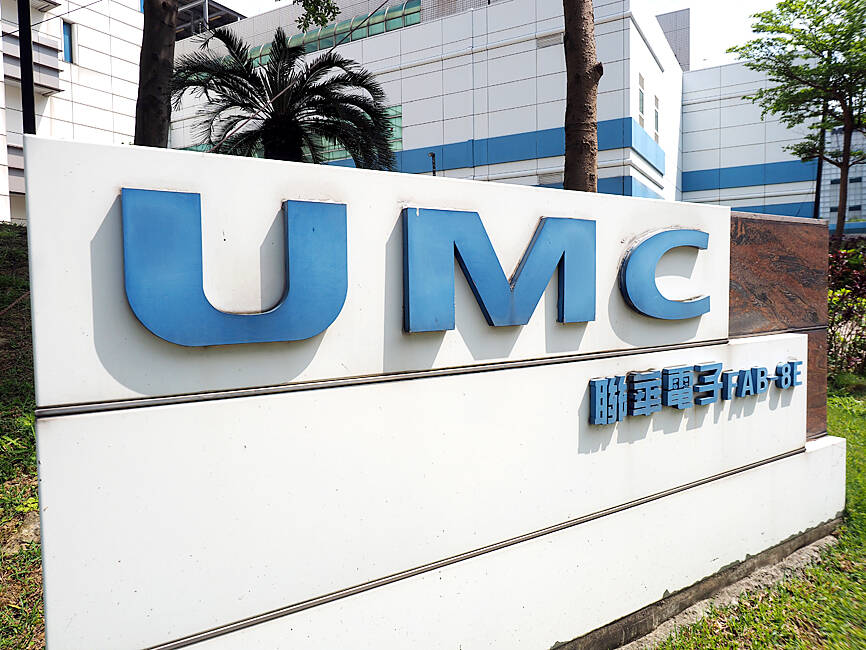United Microelectronics Corp (UMC, 聯電), the world’s No. 3 contract chipmaker, yesterday projected that its factory utilization would dip further to about 65 percent this quarter, after an inventory-driven industry slump pushed its second-quarter net profit to its weakest level in eight quarters.
UMC, which has not seen its factory utilization rate fall to as low as 65 percent since the fourth quarter of 2011, said it was difficult to predict if the rate would bottom out this quarter, as customers are expected to extend inventory destocking to next quarter, while end-market demand remains sluggish.
However, the company expects utilization of its 22-nanometer and 28-nanometer process technologies to remain resilient this quarter, thanks to a broad customer base and diverse product offerings.

Photo: David Chang, EPA-EFE
UMC said it would continue to expand its 28-nanometer capacity in Tainan, as most of the capacity is covered by long-term supply agreements with customers.
“Wafer demand outlook in the third quarter is uncertain, given prolonged inventory correction in the supply chain,” UMC chief executive officer Jason Wang (王石) told investors.
Inventory digestion in the smartphone, computer and server sectors has fallen short of the company’s expectations, Wang said.
“While we saw spots of limited recovery in the second quarter, overall end-market sentiment remained weak and we expect customers to continue stringent inventory management in the near term,” he said.
UMC expects wafer shipments to drop by about 3 to 4 percent sequentially this quarter, while average selling prices would rise about 2 percent.
Gross margin this quarter would slide 1 to 3 percentage points from 36 percent last quarter due to higher manufacturing costs, including electricity, raw materials and labor.
Net profit fell 3.3 percent to NT$15.64 billion (US$500.4 million) last quarter, compared with NT$16.18 billion in the first quarter and NT$21.33 billion a year earlier.
Earnings per share dropped to NT$1.27 from NT$1.31 in the first quarter and NT$1.74 a year earlier.
UMC yesterday further revised down its forecast for world semiconductor revenue this year, projecting an annual decline of about 5 percent, instead of the drop of 1 to 3 percent it estimated in April.
The foundry sector would see an even sharper drop of 15 percent compared with its earlier estimate of a high-single-digit percentage decline this year, it said.
Nonetheless, UMC would double its silicon interposer wafer capacity, which is used in advanced chip packaging technology, by the middle of next year to cope with growing demand for artificial intelligence chips, Wang said.

Taiwan Semiconductor Manufacturing Co (TSMC, 台積電) yesterday said that its investment plan in Arizona is going according to schedule, following a local media report claiming that the company is planning to break ground on its third wafer fab in the US in June. In a statement, TSMC said it does not comment on market speculation, but that its investments in Arizona are proceeding well. TSMC is investing more than US$65 billion in Arizona to build three advanced wafer fabs. The first one has started production using the 4-nanometer (nm) process, while the second one would start mass production using the

‘SILVER LINING’: Although the news caused TSMC to fall on the local market, an analyst said that as tariffs are not set to go into effect until April, there is still time for negotiations US President Donald Trump on Tuesday said that he would likely impose tariffs on semiconductor, automobile and pharmaceutical imports of about 25 percent, with an announcement coming as soon as April 2 in a move that would represent a dramatic widening of the US leader’s trade war. “I probably will tell you that on April 2, but it’ll be in the neighborhood of 25 percent,” Trump told reporters at his Mar-a-Lago club when asked about his plan for auto tariffs. Asked about similar levies on pharmaceutical drugs and semiconductors, the president said that “it’ll be 25 percent and higher, and it’ll

When an apartment comes up for rent in Germany’s big cities, hundreds of prospective tenants often queue down the street to view it, but the acute shortage of affordable housing is getting scant attention ahead of today’s snap general election. “Housing is one of the main problems for people, but nobody talks about it, nobody takes it seriously,” said Andreas Ibel, president of Build Europe, an association representing housing developers. Migration and the sluggish economy top the list of voters’ concerns, but analysts say housing policy fails to break through as returns on investment take time to register, making the

CHIP BOOM: Revenue for the semiconductor industry is set to reach US$1 trillion by 2032, opening up opportunities for the chip pacakging and testing company, it said ASE Technology Holding Co (日月光投控), the world’s largest provider of outsourced semiconductor assembly and test (OSAT) services, yesterday launched a new advanced manufacturing facility in Penang, Malaysia, aiming to meet growing demand for emerging technologies such as generative artificial intelligence (AI) applications. The US$300 million facility is a critical step in expanding ASE’s global footprint, offering an alternative for customers from the US, Europe, Japan, South Korea and China to assemble and test chips outside of Taiwan amid efforts to diversify supply chains. The plant, the company’s fifth in Malaysia, is part of a strategic expansion plan that would more than triple